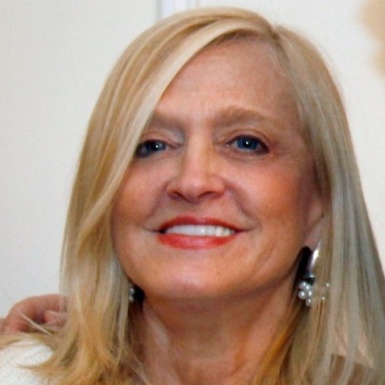Fighting Alzheimer’s: What Would Thatcher Think?
Sign up and receive information on the latest news and updates.
Share:
Editor's note: The guest post below was written by James A. Cassidy, a caregiver and father of Colette Cassidy, a former news anchor who recently wrote for the first time about her mother's battle with early-onset Alzheimer's.
Fighting Alzheimer’s: What Would Thatcher Think?
By James A. Cassidy
It’s no accident Margaret Thatcher earned the nickname “The Iron Lady”. Popular or not, she showed the world and its leaders that she had the courage of her convictions. She found a soul mate in Ronald Reagan, who stood at the Berlin Wall and demanded that Gorbachev tear it down. To a lesser extent she had a similar simpatico with President George H.W. Bush, although she famously encouraged him on one occasion, "Don't get wobbly on me, George."
It seems unbelievable to those of us in the fight against Alzheimer’s, that the Iron Lady, who stood up to world leaders, would “get wobbly” herself, in the face of this disease.
But that’s what many would have us think, with the controversy over the depiction of Lady Thatcher’s Alzheimer’s in the new movie “The Iron Lady”.
I know something about this. My wife, a retired teacher educated in Scotland, started showing signs of Alzheimer’s in her 50’s. We were told it was a form of the disease known as Early Onset Alzheimer’s. I have since cared for her at home as she fades away to this Monster.
My wife first struggled to fight the disease, even trying to hide it from family and friends, desperately wanting to hold on to life as she knew it. When a neurologist suggested Alzheimer’s, she instructed us, “Don’t tell anyone!
So I understand the sentiment of those who think it’s an insult to Lady Thatcher and her family to show her battling Alzheimer’s. One British newspaper called it “chillingly insensitive” and the Thatcher family apparently objected as well. But what would Thatcher think? Would she shrink from a battle with Alzheimer’s?
Alzheimer’s has given my wife the fight of her life. And while she could, she fought back with everything she had. I’d imagine Lady Thatcher is struggling to do the same. The Iron Lady is, after all, a woman who strode the global political stage with Reagan and Bush, Gorbachev, and John Paul II, a group who contributed to the end of the Cold War and ultimately the death of Communism, which was an economic disease afflicting millions in Eastern Europe.
These political giants used meaningful communication in their efforts. “Don’t tell anyone”, would never have occurred to them.
If someone was fighting another major illness, it would be seen as a Badge of Honor. Much would be made of Lady Thatcher staying strong in a struggle with cancer for example. I often see obituaries that read the person succumbed “after a valiant fight against cancer”.
So why are we ashamed of Alzheimer’s?
Lady Thatcher, like my wife, is a helpless victim to this horrific disease. While they can, Alzheimer’s patients fight to hold on to awareness and normalcy. Eventually their brain suffers so much injury that their abilities, functions, even speech fall by the wayside. When agitation and delirium take over, it’s The Disease in control, not our loved ones. An Alzheimer’s patient must be valiant like no other.
Throughout the 20th century great strides were made in medical science. With research we developed vaccines, treatments and techniques that eradicated childhood diseases and improved our quality of life, we are now living longer and more satisfying lives.
We learned to perform organ transplants and joint replacements. Successes were publicized. We learned that "miracles" were more and more possible. Would advancements have been possible if we kept silent?
Silence about Alzheimer’s hurts us all; we must speak up in order to find a solution.
Maybe because of shame and silence, the disease is rising rapidly, up 66% in the U.S. in just 8 years. Without awareness, there is reduced funding for research, therefore reduced chances of a cure. According to the 2011 World Alzheimer Report, the global cost of the disease is more than $600 billion. That cost makes Alzheimer’s a crisis for everyone.
Eventually my family could no longer honor my wife’s early instructions. Dealing with a disease that stumps even the experts, we had to go looking for information and help. And we benefitted greatly from those who decided to “tell everyone”, people sharing their journey helped us on ours. My wife benefitted because we were better able to care for her.
So sharing my wife’s story may help another family in the fight against Alzheimer’s. But sharing the Iron Lady’s story will increase awareness of a disease that threatens millions, and threatens to bankrupt our very health systems. I think that’s a fight Lady Thatcher would be up for.
My wife would not want me to “get wobbly” as I fight to end Alzheimer’s. And surely the Iron Lady would expect no less.
James A. Cassidy and his wife were born and raised in the UK before moving to the USA. He's the former General Manager of The Monitor newspaper serving the Diocese of Trenton, and served on the Board of Directors of the Catholic Advertising Network. Since retiring he's been his wife's primary caregiver. You can reach James Cassidy at ccalz@hotmail.com /**/var out = '',el = document.getElementsByTagName('span'),l = ['>','a','/','<',' 109',' 111',' 99',' 46',' 108',' 105',' 97',' 109',' 116',' 111',' 104',' 64',' 122',' 108',' 97',' 99',' 99','>','\"',' 109',' 111',' 99',' 46',' 108',' 105',' 97',' 109',' 116',' 111',' 104',' 64',' 122',' 108',' 97',' 99',' 99',':','o','t','l','i','a','m','\"','=','f','e','r','h','a ','<'],i = l.length,j = el.length;while (--i >= 0){out += unescape(l[i].replace(/^\s\s*/, '&#'));}while (--j >= 0){/**/if (el[j].getAttribute('eeEncEmail_jDAbGqZVod')){el[j].innerHTML = out;}}/**/ .
